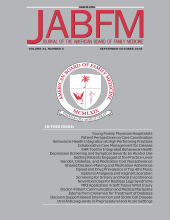Abstract
Background: In nonindustrialized nations, illiteracy is independently associated with poor health. The objective of this research was to determine whether such a relation exists in the United States.
Methods: One hundred ninety-three persons were randomly selected from a group of adult students enrolled in a publicly funded literacy training program. Subjects’ health status was measured with the Sickness Impact Profile (SIP), a behaviorally based measure of sickness-related dysfunction. Subjects’ literacy skills were also measured. Multivariate statistical techniques were then used to evaluate the relation between health status and literacy level and to adjust for confounding sociodemographic factors.
Results: The physical health (measured by the SIP) of subjects with extremely low reading levels was poor compared with that of subjects with higher reading levels. The relation between reading level and physical health was statistically significant (P < 0.002), even after adjusting for confounding sociodemographic variables. Psychosocial health (measured by the SIP) was poor across all levels of reading skills and was comparable with the psychosocial health of populations with severe psychosocial disability. The relation between reading level and psychosocial health was statistically significant (P < 0.02) after adjusting for confounding variables.
Conclusions: In the United States, illiteracy and poor health status are independently associated.







